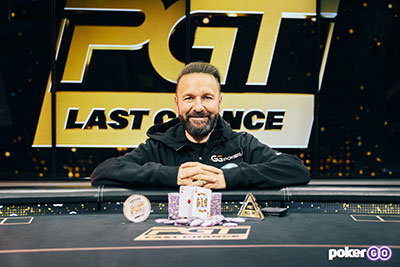Poker Notes
Daniel Negreanu reflects on 2023 losses, New York eyes online poker, MIT offers free poker courses
By Sean Chaffin
This month’s “Poker Notes” takes players behind the bad beats and major payouts. Instead, check out a deep analysis of Daniel Negreanu’s seven-figure losses in 2023 and what he plans on doing about it. Players looking to work on their skills at the table also have a chance with some free courses at MIT, of all places. On the legislative front, there’s even a chance online poker may be coming to New York.
 Daniel Negreanu Looks to Regroup After $2 Million Loss in 2023
Daniel Negreanu Looks to Regroup After $2 Million Loss in 2023
Canadian professional poker player Daniel Negreanu regularly pulls back the curtain on the reality of life as a poker pro, including his own results. In January, Negreanu analyzed his finances for 2023, which included $2.2 million in losses. Negreanu has $52 million in live tournament winnings, but last year was one of his only losing years at the poker table.
So what exactly went wrong? Some of those losses were simply the result of variance, he noted, with some tough luck coming his way in all-in pots. He also thinks some of his own play was to blame and plans on some adjustments in 2024. He secured two scores above $100,000 in 2023, meaning there were fewer deep runs in some major tournaments.
Negreanu also played more tournaments in 2023 than he ever has before at 145 events. His previous high of 107 came in 2022. Of those 145 tournaments, Negreanu cashed in 39 for a percentage of 26.9%.
Even that number is a bit elevated as Negreanu determines the percentage based on the number of tournaments, not entries within an individual event.
A late season-win at the Super High Roller Bowl in 2022 for $3.3 million also left Negreanu on a major high going into 2023, which may have brought on some “winner’s tilt,” he said, meaning that he may have viewed certain tournaments as less important and lost some considerable funds by not always playing his best. A bit of cockiness may have cost him.
“What that led to was me sort of coming in and being nonchalant and not caring as much because I went from playing a $300K buy-in for $3.3 million to playing some $10,000 buy-in tournaments,” he said. “And ultimately I found myself not really caring as much about each bullet [re-entry], rebuying too much, being sloppy.”
A busy tournament also left the six-time World Series of Poker bracelet winner running on fumes at times and not always feeling “into” playing. Some side bets on certain accomplishments at the tables may have had his mind on other things rather than the tournament at hand and playing his best every day.
“Just by sheer numbers, I was playing far too often,” he said. “Part of the reason for that was I sort of made the mistake of making a couple side bets. And they weren’t even that big or that important. But I made a couple side bets on PokerGO Tour points.
“Generally speaking, when I’m playing too many tournaments … it leads to some fatigue for sure, which leads to some weaker play – just not as focused and things like that,” he said. “But also it leads to some sloppiness where you just don’t care enough about each bullet as much as you should. I do my best when I really want to play.”
This year will bring some major changes to Negreanu’s routine. He’s reducing the number of tournaments he plans on playing with the WSOP on his list as well as heading to the new WSOP Paradise in the Bahamas, which launched in December. A Triton event in South Korea possibly could be on the agenda with a few GGPoker online events also mixed in. He plans on competing only when he feels up to it and looks to “gamble less” by taking every buy-in level tournament more seriously.
The new attitude has already paid off for the 49-year-old poker pro. In January, he won a $10,100 buy-in event that kicked off the PokerGO Tour Last Chance, topping a 91-entry field to win $218,400. That was followed by a runner-up two weeks later for $105,000.
“I won late last night and today I recover on the couch and will play again when I NEED to play,” he noted on X (Twitter). When I can’t WAIT to play and not a moment sooner. And I’m proud of myself because before this epiphany I’d be at the studio right now yawning and just going through the motions.”
 Are Online Poker & Casino Gaming in the Works for New York?
Are Online Poker & Casino Gaming in the Works for New York?
Legalized online poker in New York may be in the works after a bill, which would also legalize online casino play and lottery sales, was introduced in the state assembly in January. The state is staring at a potential budget shortfall of $7 billion for fiscal year 2025, and some legislators see online gaming as an opportunity to curtail some of that. Longtime online gaming proponent Sen. Joseph Addabbo (D-Queens) introduced the bill in the state senate and believes he has a chance to succeed.
“It’s a good bill,” Addabbo told NY1. “We got a lot of input from a lot of individuals, but it’s a starting point. It’s a starting point where I’m hoping that we can have these kinds of discussions during the budget process.”
Some estimate iGaming could produce an extra $1 billion a year for state coffers. Getting the bill across the finish line, however, isn’t a sure thing. Legislators have brought forward similar bills in the past, but those efforts proved fruitless. The state’s financial picture may now offer a chance at success. Addabbo has pointed to New York’s success in legalizing online sports betting and that revenue stream may coax other legislators to move forward with additional online gaming. Plans call for a 30.5% tax rate and $2 million licensing fee.
“What we’re seeing is that mobile sports betting in New York is being perceived as the number one product in the country,” Addabbo told Poker Industry Pro in November. “We should build upon that. The timing for iGaming is perfect in the sense that we’re showing that New Yorkers have the propensity and the desire to game with a device, as well as going through a brick-and-mortar site.”
Legalized states like New Jersey, Michigan and Pennsylvania produced several state revenue records in 2023, and New York offers a major target for the industry. For poker players, seeing New York’s 20 million people as part of the country’s Multi-State Internet Gaming Agreement (MSIGA) could bring major boosts to online poker players and prize pools. MSIGA allows for shared liquidity among poker operators in Nevada, Michigan, New Jersey and Delaware. Other states have also considered adding online gaming recently, including Maryland.
MIT Serves Up Free Poker Courses
The Massachusetts Institute of Technology (MIT) is recognized as one of the country’s leading universities with cutting-edge research and training future leaders. Some of that now apparently includes poker as part of the MIT Open Learning program. Open Learning is online courses taught by university faculty that are completely free for members of the public.
The school recently announced two poker courses as part of this year’s offerings. Those interested in improving their skill can check out “Poker Theory and Analytics” or “How To Win At Texas Hold’em Poker.” The classes offer some skill-building opportunities and insight into the game. Poker Theory and Analytics has been part of the Open Learning curriculum for several years and focuses on a bit more than just poker. The course focuses on some of the game’s key elements and how those skills can also be translated to the business and investing world.
The syllabus notes that beyond simply gaining poker skills and tournament strategy, students will “develop the basic foundation for decision-making in poker.” Homeworks includes tournament play and instructor Kevin Desmond brings a deep background in the game to the subject.
“I spent several years playing poker professionally while studying finance as an undergraduate at Villanova University,” he said. “I chose to join Morgan Stanley as a trader rather than pursue poker as a career. My transition into trading was very seamless as a result of my experience playing poker and interest in game theory concepts. I would like MIT students to have the same opportunity.”
Business professor Will Ma teaches How To Win At Texas Hold’em Poker. He also has some kins [lisa, does “kins” make sense to you?] on the wall with more than $680,000 in live tournament winnings. Students will get a complete look at the mathematics behind the game, preflop ranges, variance and much more. Battling it out in an online poker league is also part of the class schedule.
The Open Learning program seeks to bring education opportunities to lifelong learners around the world. Courses feature complete lectures, videos, notes and study materials. Other courses recently announced include topics like classical music, learning conversational Italian and thermodynamics.
“The mission of Open Learning is to share knowledge,” MIT Vice President for Open Learning Vijay Sarma says. “We want to make sure that learning isn’t this thing we keep, but people can take and do something with it – for their lives, for their enjoyment, for the fulfillment of their ambitions, their dreams.”
Sean Chaffin is a freelance writer and senior writer for Casino Player and Strictly Slots magazines. Follow him on Twitter @PokerTraditions or email him at seanchaffin@sbcglobal.net for story assignments.


